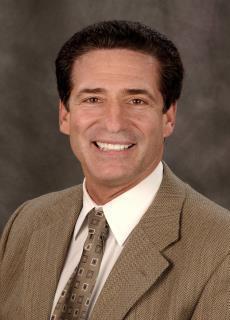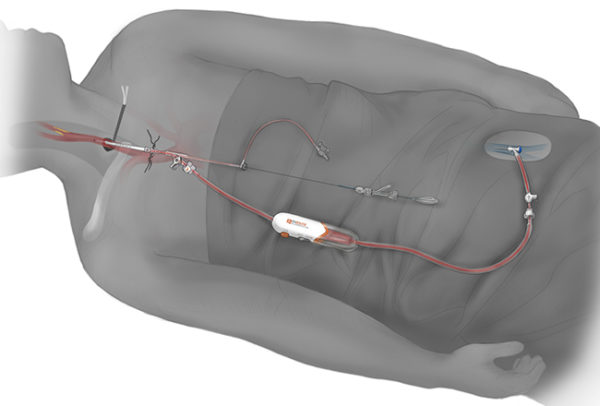
Danbury Hospital is the first in western Connecticut to offer a new, minimally invasive procedure to treat carotid artery disease.
TransCarotid Artery Revascularization (TCAR) is a clinically proven, safe option for those at high risk of complications from traditional open surgery, according to Dr. Alan Dietzek, network medical director, vascular surgery at Western Connecticut Health Network, to which Danbury Hospital belongs.
The benefit of TCAR over the main treatment options for severe carotid artery disease ”” an open surgical procedure called carotid endarterectomy (CEA) and carotid artery stenting (CAS) ”” is twofold, Dietzek said: not only does TCAR require a smaller incision than CEA, but the risk of stroke is significantly smaller with TCAR than with either CEA or CAS.
Carotid artery disease is estimated to cause up to one-third of strokes, with 400,000 new diagnoses of the disease made in the U.S. each year.

“Ten years ago (CAS procedures) were all the rage,” Dietzek said. “Everyone was doing carotid stents left and right. But the stroke rate was found to be twice that of carotid surgery.”
Two June 2018 retrospective studies published in the Journal of Vascular Surgery presented evidence that TCAR is safer. The first reported that “Patients undergoing TCAR had significantly more medical comorbidities but similar stroke/death rates and half the risk of in-hospital TIA/stroke/death. These results persisted despite rigorous adjustment and matching of potential confounders.”
The second found a lower 30-day mortality and stroke rates in patients who received TCAR than in matched controls who received CEA.
The issue, Dietzek explained, is that during a CAS or CEA, plaque in the artery can be inadvertently knocked loose and travel to the brain, heightening the chances of a stroke. TCAR involves the insertion of a stent that allows the surgeon to directly access the common carotid artery in the neck and initiate high-rate temporary blood flow reversal, thus protecting the brain from stroke.
The TCAR procedure is performed through a small incision ”” a few centimeters long ”” at the neckline just above the clavicle. The incision is much smaller than a typical CEA incision of 1 to 1.5 inches. With TCAR, Dietzek said, “we usually use a local anesthetic and a little sedation,” with the procedure usually taking an hour or so, as opposed to the alternative, which can take up to about four hours.

Danbury Hospital”™s first TCAR was performed on Sandra Jellinghaus of Watertown, whose impromptu Life Line mobile clinic screening indicated that she had carotid artery disease. Her primary care physician referred her to Dietzek, who confirmed her left carotid artery was 80 percent blocked. As is often the case, Dietzek said, the 78-year-old Jellinghaus showed no symptoms of the disease.
“I wasn”™t expecting my diagnosis,” Jellinghaus said. “I follow a healthy lifestyle, and there”™s no family history of carotid artery disease.”
“She was a little hesitant” when presented with the new procedure, the doctor said. “But I explained the results that had been recorded so far, and how I thought it could benefit her.”
Jellinghaus was a good candidate for TCAR because she was at higher risk of experiencing complications from CEA due to the anatomy of her arteries and veins, he added.
“I felt reassured knowing there was a lower risk of a procedural stroke,” Jellinghaus said. She left Danbury Hospital less than 24 hours after the procedure. “I have more peace of mind now, especially after I had my last ultrasound, which confirmed that my arteries are unblocked.”
After one post-op appointment, Jellinghaus will only need to see Dietzek for a one-year follow up.
“We”™ve done five or six of these procedures since July,” Dietzek said, noting that the skills involved in performing a TCAR “are not all that different” from the alternative surgeries. He noted that his Danbury Hospital colleague Dr. Dahlia Plummer has started performing TCARs as well, with another two doctors now undergoing training.
 “TCAR is not for everybody,” he said. “But for candidates with a high degree of arterial narrowing, it can be a great option.”
“TCAR is not for everybody,” he said. “But for candidates with a high degree of arterial narrowing, it can be a great option.”
Hartford Hospital and the Yale Heart and Vascular Center in New Haven are the only other Connecticut locations to offer TCAR, he noted. Several others in New York City and on Long Island also perform the procedure.
“It”™s a very exciting procedure for us to offer,” Dietzek said, “and it”™s certainly beneficial to patients. The results so far have been great.
“This is the first time in a long time that I”™ve seen a procedure like this that could be a real game-changer,” he added.





















